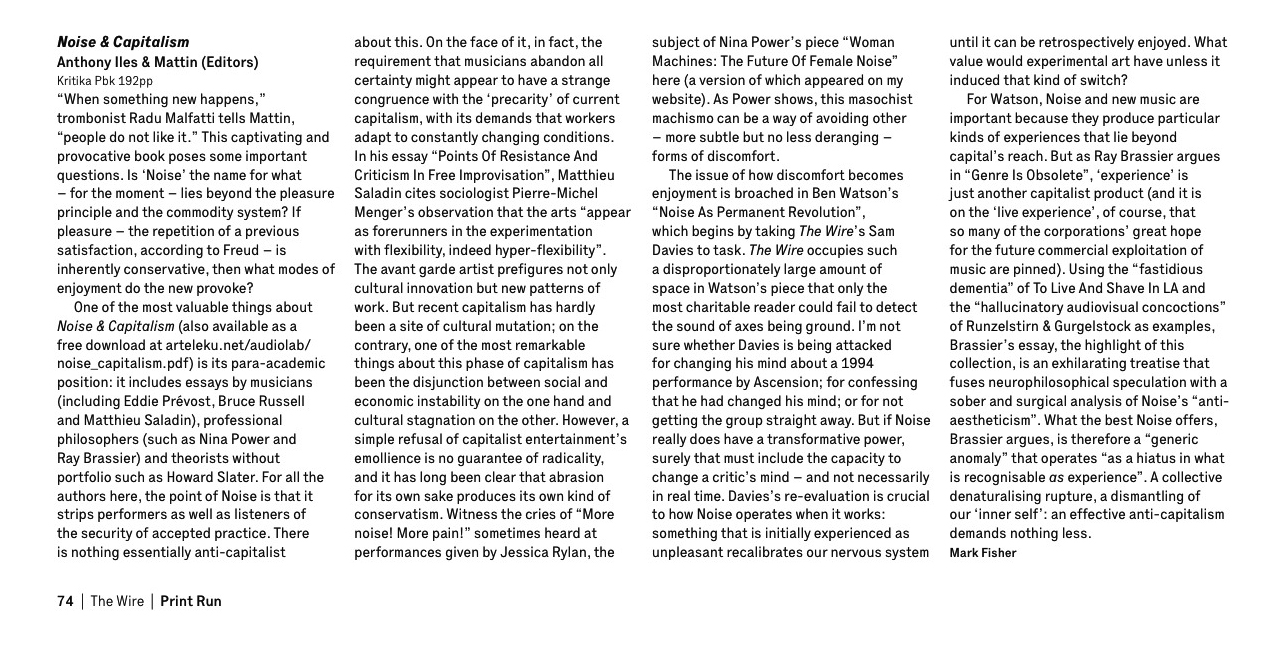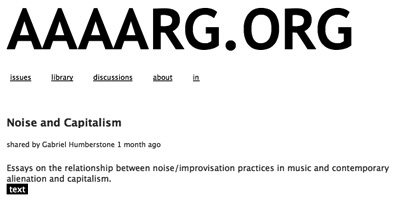Thomas Bey William Bailey (artists, researcher) from MICROBIONIC website publishes an extense review of the book on his blog. Thanks Thomas!

For those interested in reading something that provides a fine counter-weight to my own non-academic take on noise and related ‘extreme’ phenomena, there is a new book out now entitled Noise and Capitalism, available either in print form or as a FREE .pdf from Arteleku Audiolab.
Texts like these, which have been appearing in academia in steadily increasing numbers since (I’m guessing) the Brian Massumi translation of Jacques Attali’s Noise: The Political Economy of Music, can certainly be a ‘mixed bag’ of very useful insights and ones that are, well, much less so. When the latter is the case, it is often because the contributors are trying too hard to place some kind of intellectual legitimacy on activities which, if their creators receive personal edification and / or enjoyment from them (and don’t disturb others’ attempts to attain the same), should need no further justification for their existence. That is to say, some things’ value is legitimized by their ability to provide sensory stimulation and rapture in a world that is cruelly parsimonious with such things- whether restrictions on pleasure are being imposed by authoritarian political systems or by the intricacies of the human nervous system itself.
But, then again, maybe I’m missing the point- Noise and Capitalism is clearly aimed at an audience which is looking for applications of post-Marxist theory, what with its Deleuzian emphasis on the ‘thriving multitudes’, to presently existing social phenomena (yes, even ‘noise’ in which a not insignificant part of the constituency takes pride in being anti-social, a-social or just socially homogeneous.) I can only guess if it wants to secure an audience beyond those theoretical boundaries, or not. Whatever the case, the text isn’t as famously impenetrable as much of the ‘cultural studies’ or ‘lit-crit’ canon, and any unfamiliar nomenclature can be pretty quickly cleared up with a Wikipedia search or two. Any book in which the Aktionist, ‘brutal-humoroid’ overload of Runzelstirn & Gurglestock can be seriously analyzed and greeted without the typical critical outrage is already on the right course, and the book’s editors are also wise to include plenty of material from actual practicioners in this field (Mattin, Edwin Prévost, Bruce Russell etc.) in addition to those who work purely in a critical capacity. Whether your philosophical views skew towards a philosophy of self-consciousness or a philosophy determined by communication and social interaction (or, yes, a synthesis of both), Noise and Capitalism is not short on thought-provoking and challenging theses.
It would be hard to put together as diverse a journal as Noise And Capitalism without at least something sticking in my craw, though, and here that dubious honor goes to starry-eyed Trotskyite Ben Watson, of the “Militant Esthetix” website and much more besides (given my anarcho-libertarian leanings, it shouldn’t come as a surprise that we have our ‘arguing points.’) Watson contributes a little essay entitled Noise As Permanent Revolution (I told you he was a Trotskyite…), which playfully tosses about the author’s personal impressions of noise (“the sound of glass being broken by glass”) and its use as a refuge for ‘immediacy’, ‘authenticity’ and ‘resistance to commodification.’ I have no argument with these broad points, but Watson’s ‘on-the-offensive’ writing style leaves him dangerously prone to –whether intended or not- making condescending generalizations like the one below:
Beethoven belongs to a mature and well-heeled demographic which is seriously into expensive perfumes, glossy magazines, investment opportunities and real estate – he’s a timeless classic. Ascension and Keiji Haino, on the other hand, are the latest soundtrack for a few goateed web designers in Hoxton, probably accompanied by some designer toxin or other …
I have to call bullshit on this. If Watson is determining this demographic info based solely on his own local observations, then I can nullify his authority here simply by saying that I’ve had contradictory experiences: the biggest Keiji Haino fans I’ve known have lived hand-to-mouth in shoebox apartments, using their intermittent and unglamorous employment to buy cheap noodle cups rather than lattes. This “proves” nothing, but then again neither does Watson’s observation- in which he seemingly insinuates that some kind of moral or political conclusion can be inferred from the kind of audience that appreciates a certain type of music.
However, Watson goes on to negate this later, by admitting that artists do indeed have little control over who their audiences become. Invoking a choice kernel of Marx knowledge, he states “it is this alienation of the product from the labour of those who produce it which Marx diagnosed as the central crime and problem of capitalism.”
Having cleared the decks of that swipe at the perceived ‘fauxhemian’ fandom of certain noise-makers, Watson later offers this highly debatable assertion:
…despite its record of indifference to past music, non-deference to tradition and irreverence towards rock’s rich tapestry, Noise keeps refuelling itself from the rock tank (itself a refinement of sludge and tar tapped from the underground dead dinosaur lake of the blues).
Another wild generalization, to be sure. In the passages that surround this, Watson is clearly trying to invoke the emancipatory power of the blues -”a retort to the master in his own language”- and hinting that noise maintains a similar role in a world where a very noisy tele-visual assault of appropriated, ideologically neutered positions functions as the ‘master’s voice’. Yet it’s still a stretch to insist that rock ‘n roll is the fuse for all of this. Am I to believe that someone like Whitehouse’s William Bennett is being totally disingenuous when he spends the better part of his career criticizing rock orthodoxy, dismissing rock ‘n roll as a “musical fast food chain?” Was Sun Ra, another pioneer of electronically saturated noise, just being annoyingly contrary when he failed to show a reciprocal interest in the Detroit ‘noise rock’ revolutionaries who embraced him as one of their own? And am I alone in missing the ‘rock’ influence in the amplified natural and biological processes that comprise, say, much of the releases on the Touch / Ash International labels? To be fair, none of the above artists ever, to my knowledge, referred to themselves as ‘noise artists,’ but at least one of the above -Whitehouse- is cited by Watson as an example of such.
More damning to Watson’s claim, though, is that the broad set of exemplars I’ve listed here do NOT have a “record of indifference to past music”, in fact, I’d consider them to be more authoritative on the subject than many people who get paid small sums here and there to write on it. By and large, I have found that ‘noise artists’ became what they are because of an enyclopedic knowledge of all musical styles rather than a paucity of musical knowledge: what kind of sound does one make when they’re enamored of dozens of different musical styles, and don’t want to give precedence to one or the other? The veteran Japanese artists like Merzbow and Violent Onsen Geisha make sound that seems perfectly representative of people who want to make a pluralistic yet highly personal outpouring of raw sound (although, as we know, this isn’t their sole motivation for doing what they do.)
Of course, I have to cede to Watson a superior knowledge of political and perhaps flat-out literary education (this is partly due to Watson’s having a far more substantial number of birthdays behind him.) His venomous disses towards his former employer at The Wire (whose editor he claims told him to “think niche” in his writing) also provide a bit of sardonic humor to his piece, something sorely lacking in Bruce Russell’s much drier contribution to Noise and Capitalism. Unfortunately, Watson’s own writing is hamstrung by his quirky yet harmful penchant for generalizing.
Of all the perspectives brought up in this book, one seems like it could have been dealt with in more detail: that of noise collection and market over-saturation as an affirmation of capitalistic commodity fetishism. Haven’t we all seen, from time to time, portraits of ‘noise artists’ or noise enthusiasts posing triumphantly in front of their formidable record collections as if they’re trophy animals? And, if Mr. Watson can assume that Keiji Haino’s target audience is a limited coterie of trust-funded design brats, couldn’t I also assume that the super-sized discographies of certain ‘noise artists’ are cultivated for reasons that cleave closer to mundane, capitalistic profit motives than enlightened cultural critique? To his credit, Csaba Toth offers an alternative interpretation for this phenomenon in his contribution: “…what Russel A. Potter says about hip-hop appears to be true also for Noise music: ‘the recognition that everything is or will soon be commodified has … served as a spur, an incitement to productivity.’”
So, a few Watson missteps aside, this is recommended for those who want to see the world of palpable and ultra-direct audio vulgarly known as ‘noise’ within the larger context of social history. For those lovers of this aesthetic who are already receiving all the satisfaction they need on a visceral level, it probably won’t be as essential, but will still provide opportunities enough for learning how all this is viewed from other perspectives.
(post-script: while it’s impossible for me to tell which side of the Watson / Wire conflict -represented by editor Tony Herrington- is “in the right,” it seems like the flame war is on …)




